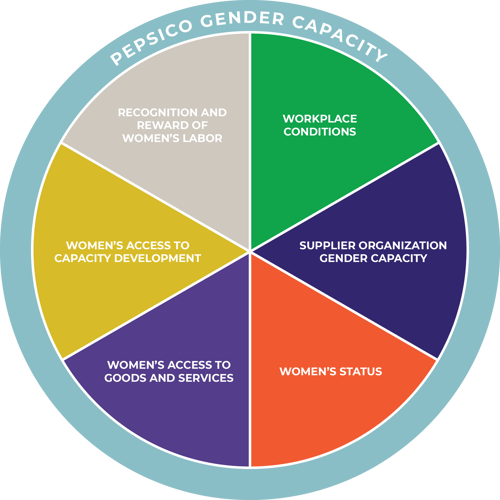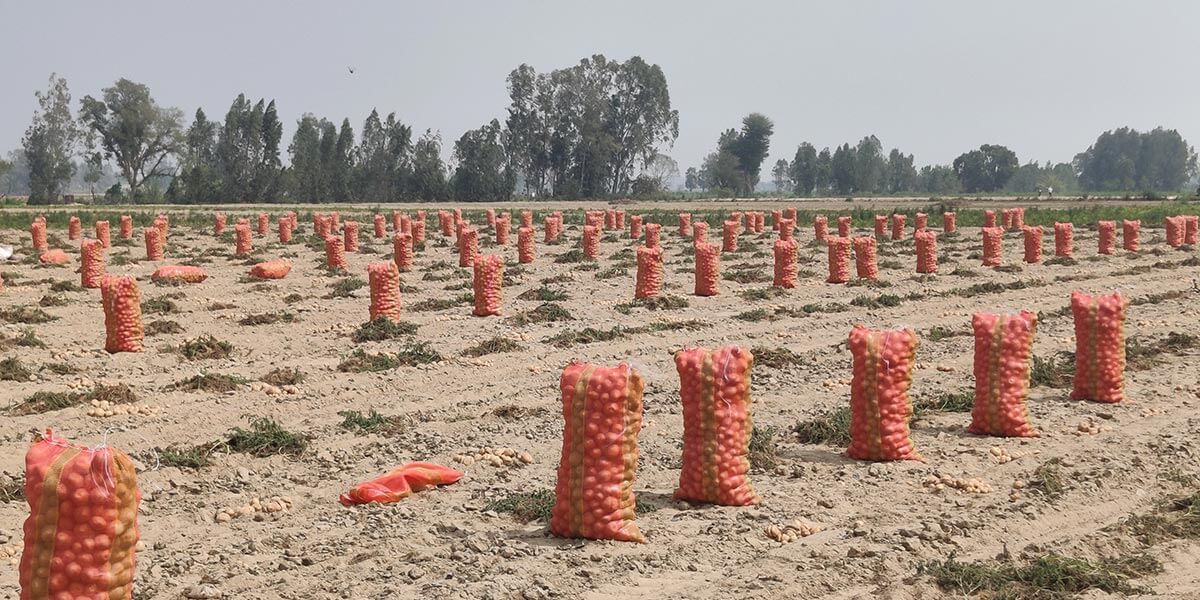In June of 2020, PepsiCo and USAID launched a $20 million partnership to promote women's economic empowerment in the company’s supply chains across Asia and Latin America.
This five-year alliance—building on prior collaboration in India—aims to demonstrate how investing in women can generate greater business growth, profitability, and sustainability in agricultural supply chains. Resonance, with the International Center for Research on Women (ICRW), serves as the technical lead of this partnership, facilitating alignment between USAID and PepsiCo and managing the implementation of global and country-specific activities.
A compelling need exists for a strategic collaboration like this. Though women make substantial contributions to global food systems and constitute a majority of the agricultural workforce in many emerging markets, they face bias and historical disadvantages at home, on farms and in business, leaving them far less access to training, technology, finance, and land than men in the same markets.
By shifting norms and resources to close these gender gaps, women-run farms could increase yields by up to 30 percent—a figure that would lead not only to higher household earnings, but also to more resilient farming communities, economic growth, and an increased global food supply, to say nothing of the potential business benefits for buyers like PepsiCo.
As part of this effort, Resonance and ICRW Advisors have created the Supply Chain Empowerment Framework (SCHEF), based on an adaptation of the Role Change Framework developed by the UK AID-funded ÉLAN RDC initiative.
SCHEF is an approach to help PepsiCo and other companies assess changes in women’s economic empowerment and gender equity across global supply chains
This tool allows agricultural buyers to understand the specific gendered context of their supply chain, design relevant interventions that empower women, and measure progress across a set of customizable indicators.
Barriers to Advancing Women’s Empowerment in Supply Chains
Companies face several critical barriers to understanding and impacting women’s empowerment in their supply chains.
1. Geographic and Contextual Variability
Within PepsiCo’s expansive footprint, for instance, different geographies present different challenges and avenues for women’s empowerment and gender equality. In countries where most of the supply comes from large commercial farms, the working conditions of women laborers may be a critical concern. In countries where supply is instead sourced from smallholder farmers, improving women’s roles in decision-making, their technical capacity, and their access to quality inputs may be more important.
2. Limited Visibility into Nuanced Gender Roles and Contributions
Agricultural buyers may also have limited awareness of the roles women already perform in different segments and geographies of the value chain. Failing to recognize women’s current and potential contributions can obscure effective paths to empowerment beyond the most apparent approach of integrating them as direct suppliers.
3. Tools That Are Out of Sync with Private Sector Realities
Some of the existing tools to measure and improve women's economic empowerment are not private sector focused. They’re typically too resource-intensive to scale across global supply chains, lack the flexibility to be tailored to different supply chain contexts, and too often overlook the links to buyers’ business objectives and sustainability indicators.
Learn 3 Key Areas for Women's Empowerment
A New Tool for Agricultural Buyers: The Supply Chain Empowerment Framework (SCHEF)
To advance gender equity in complex global supply chains, companies need a model that is flexible enough to work in a variety of contexts yet standardized enough to provide useful measures and outcomes. It also needs to align with the business case for investments in women’s economic empowerment. We built the Supply Chain Empowerment Framework (SCHEF) with these needs in mind.
The SCHEF toolkit has three dimensions: the Assessment, the Intervention Bank, and the Indicator Bank.
SCHEF Assessment Tool
First, the Assessment tool pushes regional supply chain actors to consider women’s economic empowerment across seven domains that are within their sphere of influence and most likely to provide business value and risk mitigation. These domains are:
1. Internal Gender Capacity, or changes within a company (PepsiCo, in this case) that improve gender-related knowledge, attitudes, skills of staff, and enhance institutional policies and practices.
2. Recognition and Reward of Women's Labor, ensuring that women’s positions in the supply chain are made more formal and visible to key actors.
3. Work Conditions for Women, pushing workplace conditions, policies, and facilities on farms and within other supplier organizations to be safe, equitable, and more favorable for women.
4. Supplier Gender Capacity, or changes in gender-related knowledge, attitudes, skills, and practices for a range of key suppliers.
 5. Women’s Status, targeting improvement to women’s voice, decision-making, and self-efficacy; more equitable norms around leadership and land rights; and opportunities for women to move into new or upgraded roles.
5. Women’s Status, targeting improvement to women’s voice, decision-making, and self-efficacy; more equitable norms around leadership and land rights; and opportunities for women to move into new or upgraded roles.
6. Women’s Access to Goods and Services, to give women ongoing, increased access to the goods and services they need to improve their economic situation (e.g., market information, financial services, childcare services, safe transport).
7. Women’s Access to Capacity Development, to ensure women have ongoing access to on-farm training provided by an employer or partner.
SCHEF Intervention Bank
After the Assessment, the SCHEF Intervention Bank provides managers with a menu of women’s empowerment activities that align with the domains in which they’ve chosen to prioritize.
If a company is trying to improve farm conditions for women, for instance, it might pilot on-farm childcare facilities or carry out a compliance and certification program for suppliers.
Or if a company wants to improve internal gender capacity, it could prioritize hiring women in roles that provide outreach and technical assistance to farmers through more intentional recruitment efforts.
SCHEF Indicator Bank
Third, and finally, the SCHEF offers an Indicator Bank, which gives managers a set of metrics aligned to activities from the Intervention Bank. These indicators allow for the measurement and comparison of progress in a standardized way.
Catalyzing Gender Equity and Women’s Empowerment in Supply Chains
If companies are going to significantly invest in women’s economic empowerment and gender equity across their global operations, then they need to be able to understand the gendered context of their supply chain.
They also need to know how best to direct and measure their investment for sustainable impact. The Supply Chain Empowerment Framework is designed to meet these needs.
Under the Global Development Alliance, USAID and PepsiCo are currently testing the SCHEF in Colombia, India, Pakistan, and Vietnam.
Resonance will use these pilots to refine the SCHEF toolkit and make it available for other agricultural buyers. By working to demonstrate the business value in investing in women, Resonance hopes that other global companies will recognize and pursue the powerful connection between women’s empowerment and increased business viability and growth.
Photo Credit: Shawan Ali, India Country Manager, Location: Uttar Pradesh, India


